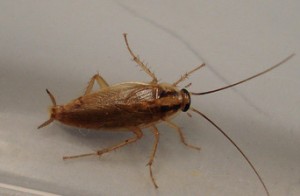An Appetite for Destruction: Why German Roaches are Not Welcome in the Kitchen
It’s nighttime and you walk into your kitchen with the intention of having a late night snack. You flip on the light just to notice insects scurrying back into the cracks and crevices of your cupboards, under the sink and behind the appliances.
Most likely, you have encountered a german cockroach infestation. “Forget the snack,” you think to yourself. “I don’t have an appetite.”
An Epicurean Appetite
German roaches always have appetites. They will eat anything that is organic, including crumbs, grease, sweets, and other insects — including other German cockroaches. They will also eat soap, glue and paper. They scavenge around, spending much of the evening and early morning hours eating and drinking. Because their diets are so versatile, they easily adapt and are found everywhere humans live.
Not only do German cockroaches have a healthy appetite for food, they also have a healthy appetite for reproduction as well, as they multiply very fast. The female emits a pheromone, while the male detects the scent, drawing him to her.
A female produces between four and six egg cases in her entire lifetime. Each case contains anywhere between 30 and 48 eggs. This case is carried on her body until just a few days to the time when the nymphs emerge from those eggs. This happens when the egg case is about 28 to 35 days old. The lifespan of these pests is about 100 to 200 days, with females living a little longer than males.
Their appetites for both food and reproduction leads to large infestations of these insects. Moreover, these disease-carrying roaches are one of the most common reasons people call pest control professionals to evict them from their homes.
Identification
German cockroaches, blattella germanica, differ from other cockroach species in that are about half an inch in length, light brown in color and have two distinctive stripes running down from the back of their heads, right up to the wings. They have wings, but do not fly.
These cockroaches are very secretive and nocturnal by nature. It is very hard to see them during the day since they hide away from daylight and motion. When cockroaches are present during the day, it is usually a sign of a large infestation because their numbers have increased so much that they are now competing for hiding places. They spend the daytime hours hiding in crevices, cracks and other hiding places that are close to their food sources. In fact, German cockroaches rarely roam beyond five feet from their food and shelter points.
German cockroaches prefer to live in places such as kitchens, bathrooms, garbage bins and behind toilets. In short, any atmosphere providing warmth and moisture can be a haven for these creatures.
Signs of Infestation
The obvious sign of infestation has already been described: sightings at night time when someone flips on a light switch, just to see them scurrying around. Carcasses and body parts may be found lying around, as well as empty egg cases and shed wings. Dark smudges of fecal smears on surfaces will be present where they have been moving the most.
Why They Are A Problem
German cockroaches cause concern because their droppings contaminate human and animal food. They carry an array of disease-causing germs such as those causing food poisoning, allergies, dysentery, diarrhea and asthma. German cockroaches can also cause a lot of damage to walls and household items such as books.
Control Measures
All control measures begin with a careful and inspection. A good inspection makes it easier to identify nesting sites, which leads to quicker control of the roaches.
Perhaps one of the most important methods of control is sanitation. Sanitation helps deny German cockroaches of shelter and food, helping them to die out. It is therefore important to keep trash cans and dumpsters empty, promptly wash all used dishes, pick up pet food leftovers and keep all kitchen appliances such as toasters very clean at all times. Degreasing and sanitizing, particularly in and around appliances helps to reduce the roach’s food source.
Baits, by far, are the best insecticides to use in order to control German cockroaches. Aerosols, traps, dusts and insect growth inhibitors also help eliminate roaches. However, when trying to eliminate cockroaches, it is important that certain types of insecticides are not used simultaneously. For example, combining baits with other control methods such as aerosols may render the bait ineffective.
This is where a well-qualified pest management professional can provide the best results, as he or she knows not only the best methods, but also knows which specific products will get the job done. Furthermore, insecticides can be harmful to humans if not applied correctly, per the label instructions.
Interesting Cockroach Facts
- Cockroaches cannot form any memories in the morning hours. Could that be another reason why they are inactive during the day?
- The nerve cells of cockroaches can actually kill germs! This special ability may be because the roaches need to defend themselves against the germs that they live in close proximity with.
- A cockroach can survive for a week without its head. It only dies because of thirst since it can’t drink water without its head.
- Cockroaches can survive without food for a month, but they can’t exceed a week without taking water.
- Cockroaches can feed on anything because they get vitamins and amino acids from the bacteria that live in their bodies.
- While cockroaches take up to six weeks to mature, a newly born cockroach can run as fast as an adult on the very day it emerges from the egg.
